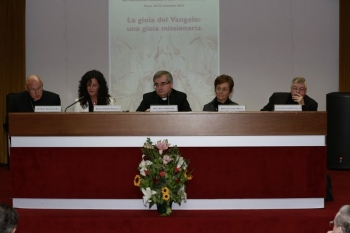The second day of the Third World Congress of Ecclesial Movements and New Communities was characterized by the introductory lecture of Professor Guzman Carriquiry, who had long be Under Secretary of the Pontifical Council for the Laity and who actually is Vice President of the Commission for Latin America. Two round tables followed.
Carriquiry inserted the course of the movements in what he defined the time of grace of the pontificate of pope Francis. In this context he said “the first question we owe to ask ourselves is: What is the Spirit of God telling us? What is he asking us to change through this pontificate? What are pope Francis’ words and acts concretely telling our movement or our community? If we do not ask ourselves seriously these questions, this probably is a concerning sign that we want to remain attached to our own certainties, indifferent to the surprises of the Spirit”.
One of the central theme of the day was the relationship of pope Francis with the ecclesial movements. Carriquiry explained that pope Bergoglio knows them very well and appreciates them, since the time he was archbishop in Buenos Aires. He has not taken it back. Instead, he has pronounced important statements: meeting them in St. Peter’s square, in the Nervi Hall meeting the followers of the Neocathecumenal Way, to the ‘charismatics’ at the Olimpic Stadium, to the Community of Saint Egidio in the St Mary in Trastevere Basilica, to the Focolare movement on the occasion of their recent General Assembly, to the Schönstatt movement celebrating their hundredth anniversary of the covenant with the Mater, and during personal audiences to founders, their successors and staff. However, there is a diversity in his approach: “his style seems to be more calm. Probably it does not enkindle your self exaltation. Does this mean that he is less convinced [of the validity] of movements? No! Probably he is more demanding.”
For pope Francis, according to Carriquiry, the heart of the problem is missionary conversion: “if we have applauded when pope Benedict reminded ecclesial movements to be always more collaborators of the universal ministry of the Pope, how important it is to be attentive to the Middle East tremendous problems (where the Christian minorities risk to disappear), to the Far East (where there is a ‘world’ to be evangelized). We feel called also by the African countries so abandoned, by the countries of the American continent (that have an urgent need to revitalize their Catholic tradition), by Europe always more dechristianized (in many parts we can see a post-Christian ‘world’), by Russia till Siberia (dialogue with the Orthodox church and the huge territories with no pastoral care). We need to go ahead also on the path of ecumenical dialogue with our Christians sisters and brothers and of dialogue and friendship with believers of other religious tradition. Watch out to any form of becoming bourgeois!”
The congress continued with a round table “A people of many faces” to which Daniela Martucci, Bishop Dominique Rey, Fr Gianfranco Ghirlanda, and Anna Pelli took place. They identified some areas in which movements can live out the pastoral and missionary conversion demanded by pope Francis.


